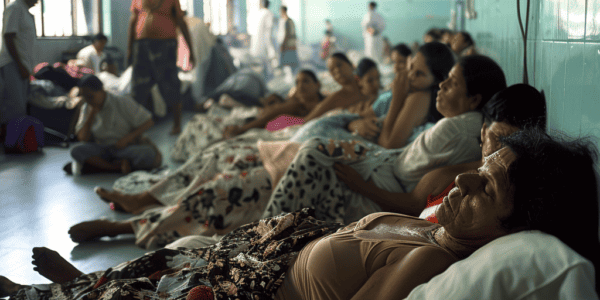Deadly Bacterial Infections Spread in Tap Water, CDC Warns – Are Your Faucets Safe?
CDC warns of deadly bacterial infections spreading in tap water, including legionella and ‘forever chemicals.’ While generally safe to drink, experts advise against using tap water in certain ways to avoid potential illness and infection, such as in CPAP machines, humidifiers, and nasal irrigation. Babies are particularly vulnerable to the potential risks of tap water, including elevated nitrate levels.
New Drug Target Identified to Prevent Kidney Failure
New research from Weill Cornell Medicine has identified a potential drug target, retinoic acid receptors (RARa), in the proximal tubules of the kidney to prevent kidney failure. The study suggests that drugs activating RARa could counteract fibrosis caused by conditions like diabetes, autoimmune diseases, or viral infections, offering hope for new treatment strategies to combat kidney failure.
Excessive Salt Consumption Linked to Heart and Kidney Health Risks, Study Finds
Excessive salt consumption can increase the risk of hypertension, cardiovascular, and chronic kidney diseases, according to a study by the George Institute for Global Health India. The research also highlighted the impact of inadequate potassium intake, associated with an increased risk of developing hypertension, cardiovascular disease, and chronic kidney disease. The study emphasizes the suboptimal intake of nutrients necessary for good cardiovascular and kidney health in the population of North India, including excessive salt consumption, inadequate potassium intake, and protein consumption below the recommended dietary allowance.
Cincinnati Health Department Warns of Potential Measles Exposure at Disney On Ice Performance
The Cincinnati Health Department warns of potential measles exposure at the Heritage Bank Center during a Disney On Ice performance on March 8. Attendees are advised to monitor their health for symptoms and seek medical advice if necessary. Vaccinated individuals have a low risk, and testing arrangements will be provided by the health department.
Is Pinching Someone on St. Patrick’s Day Actually a Crime?
Learn about the origins of the tradition of wearing green on St. Patrick’s Day and the potential legal implications of pinching someone without their consent. Find out why this seemingly harmless act could be considered a crime and how to celebrate the holiday in a respectful and lawful manner.
Researchers Make Strides in Understanding LAG-3 Protein
Researchers at Stanford University and New York University have made significant strides in understanding the properties of the LAG-3 protein, shedding light on its structure and function. This breakthrough could have far-reaching implications for the development of immune checkpoint inhibitor drug candidates targeting LAG-3. The study, published in Proceedings of the National Academy of Sciences, provides crucial insights into the molecular structure of LAG-3 and how it operates. LAG-3, like other checkpoint proteins, serves to prevent the immune system from attacking non-threatening entities. In the context of cancer, these proteins can shield tumor cells from immune recognition, hindering the body’s natural defense mechanisms. While existing antibody treatments focus on checkpoint proteins CTLA-4 and PD-1, the unique mode of action of LAG-3 presents an opportunity for novel approaches in cancer therapy. Scientists are optimistic about the potential of targeting LAG-3, driven by its distinct mechanisms compared to CTLA-4 and PD-1.
Genetic Variant Provides COVID-19 Protection for Men Under 75, Study Finds
A recent genetic analysis has revealed that a certain variant of an anti-inflammatory gene provides protection against severe illness and death from COVID-19 for men under the age of 75. The study focused on the interleukin-1 receptor antagonist (IL1RN) variant, specifically the rs419598 variant, and found that men between the ages of 19 and 74 who possessed the IL1RN variant were significantly less likely to experience severe illness after hospitalization for COVID-19, with an 80 percent lower likelihood of succumbing to the disease. The research sheds light on the genetic factors that influence the severity of COVID-19 and could potentially pave the way for targeted treatments and interventions for at-risk individuals.
Dengue Fever Spreading Across South America
Dengue fever is spreading rapidly in South America, with Brazil alone recording over 1.5 million cases and 390 deaths this year. The disease is overwhelming hospitals and prompting fumigation efforts in major cities. Epidemiologists attribute the rise in cases to global temperature increases, warning that the crisis could spread to the US and Europe as well.
Flawed record-keeping may have overstated rising maternal death rates in the U.S.
New research challenges the widely reported increase in maternal deaths in the U.S., suggesting that flawed record-keeping may have led to overstated statistics. The study found that maternal mortality rates were stable over two decades, in contrast to the reported rise in deaths. The findings call for a reevaluation of the methods used to track and classify maternal deaths in the U.S.
Rising Rates of Breast Cancer Diagnoses in Women Under 50
Breast cancer diagnoses in women under 50 have increased significantly in the past two decades, primarily driven by estrogen-receptor positive tumors. This research highlights the importance of early detection and the need for targeted prevention strategies, especially for younger Black women and those born more recently, who face a higher risk. Examining rates based on age, race, and tumor characteristics could guide the development of prevention strategies. The study, published in JAMA Network Open, reveals a consistent rise in breast cancer diagnoses among women younger than 50, with the majority of the increase attributed to estrogen-receptor positive tumors. The research aims to identify factors driving these increasing rates and design interventions to evaluate in clinical trials to lower the risk for early-onset breast cancer.










